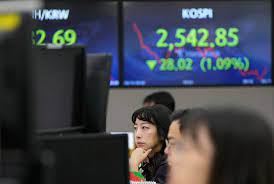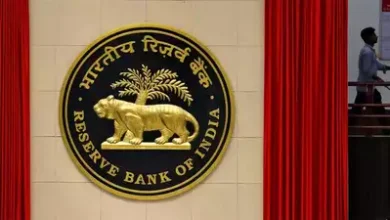Mixed Trading in Global Shares Amid China Economy Concerns
Amid concerns over the future of the US economy and depressing news on China, global markets traded in a mixed bag on Wednesday.
Germany’s DAX increased 0.2% to 15,799.93 and France’s CAC 40 grew 0.4% to 7,292.89 in early trade. The FTSE 100 in Britain hardly moved, falling less than 0.1% to 7,387.74.

With Dow futures up 0.2% at 35,073.00, US markets were expected to edge higher. Futures for the S&P 500 rose 0.2% to 4,463.00.
However, earlier in the day, benchmarks decreased in Asia.
The benchmark interest rate for New Zealand remained at 5.5% on Wednesday. The monetary policy committee of the Reserve Bank of New Zealand said that although core inflation has decreased, the overall rate of inflation is still too high. The group predicted that lowering inflation pressure would require a protracted period of restrained expenditure. The New Zealand dollar, which was trading at around US $0.60, moved little in response to the news.
Yeap Jun Rong, market analyst at IG, said that “a recent set of discouraging economic data out of China has not been encouraging for the region.”
The benchmark Nikkei 225 index for Japan fell 1.5% to close at 31,766.22. S&P/ASX 200 Australia fell 1.5% to 7,195.20. The Kospi in South Korea fell 1.8% to 2,525.64. Shanghai Composite dropped 0.8% to 3,150.13 while Hong Kong’s Hang Seng fell 1.4% to 18,329.30.
The chief economist of ACY Securities, Clifford Bennett, thinks that the current surge in US consumer spending may only be transitory and eventually fizzle out.
This may be primarily attributable to the massive sales efforts that were made at major retailers nationwide and online by Amazon. It’s possible that in August, the whole increase in retail sales may be lost. Remember, we did predict this would be a solid outcome, but it may be the last time for a while that we see excellent retail sales data,” he added.
When this year began, it was anticipated that China’s economy would expand to a sufficient level after the government lifted its anti-COVID regulations, supporting a global economy that had been battered by excessive inflation. However, China’s economy has stalled so badly that on Tuesday, it unexpectedly lowered a key interest rate and omitted to provide data on the number of young people who are jobless.
In spite of increased interest rates, the US economy has shown to be more robust than anticipated. According to a survey released on Tuesday, US retailers’ sales growth advanced quicker in July than experts had predicted.
The positive retail sales figure gives rise to optimism that the US economy would be able to maintain growth and escape the long-forecast recession. On the other hand, it may strengthen the Federal Reserve’s commitment to maintain high interest rates in order to completely suppress inflation, which would be bad news for the markets.
“Now, focus shifts to the imminent publication of the FOMC Meeting Minutes. The FOMC may need to keep interest rates high for longer, according to the minutes’ language, which might further depress financial markets, according to Tim Waterer, chief market analyst at KCM Trade.
The benchmark interest rate has already increased by the Federal Reserve to its highest level in more than 20 years. High rates affect the whole economy and lower investment prices, which is how they function.
Benchmark US crude increased 3 cents to $81.02 a barrel in the energy market. Tuesday saw a $1.52 decrease in the price of a barrel of US crude oil to $80.99. The benchmark crude, Brent, increased by 4 cents to $84.93 a barrel.
The US dollar decreased slightly in currency trading from 145.57 Japanese yen to 145.52 yen. From $1.0904 to $1.0925, the price of one euro.







